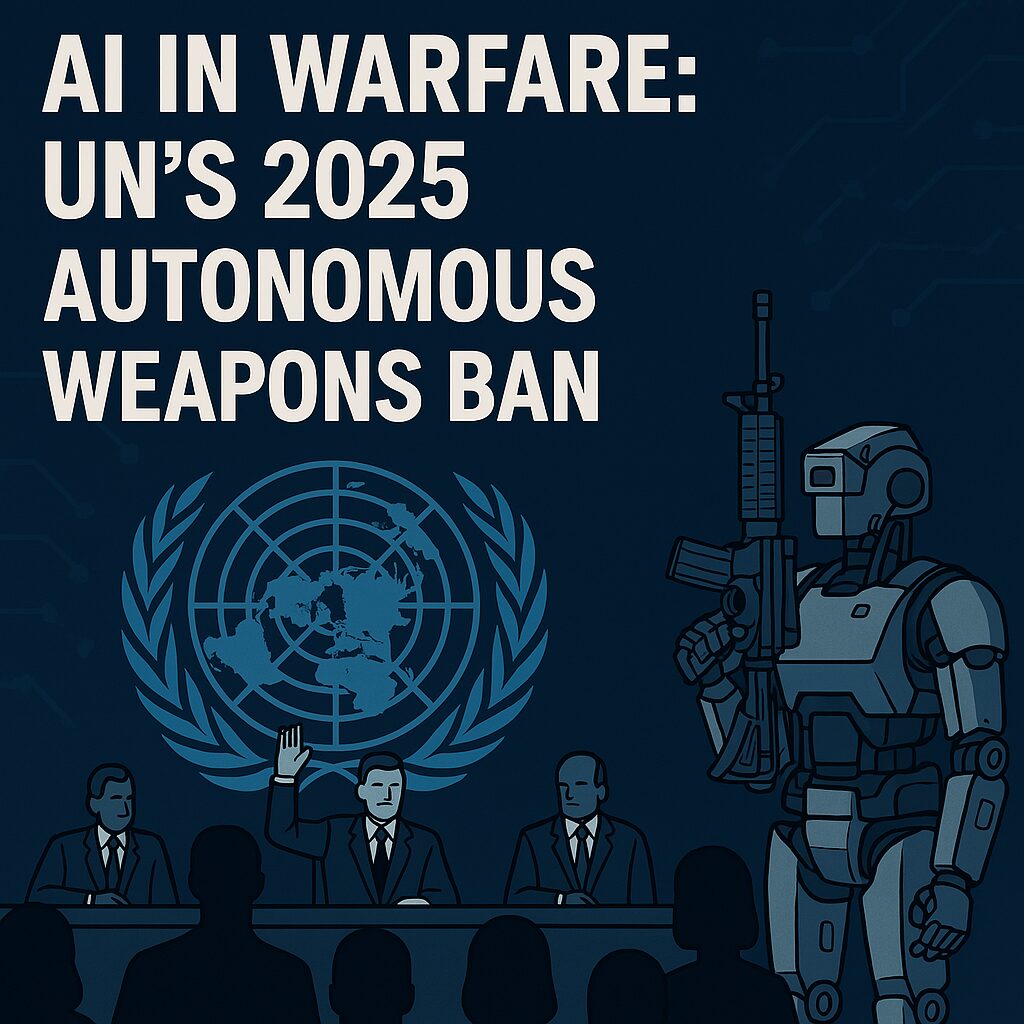Introduction
In 2025, the United Nations took a historic step toward regulating the use of Lethal Autonomous Weapons Systems (LAWS)—commonly known as “killer robots.” As AI-driven warfare escalates in conflicts like Ukraine and Gaza, the UN’s proposed ban aims to preserve human accountability, ethical warfare, and international humanitarian law.
This article explores the UN’s 2025 Autonomous Weapons Ban, its global implications, and what it means for the future of AI in combat.
🤖 What Are Autonomous Weapons Systems?
Autonomous weapons systems (AWS) are military tools powered by artificial intelligence that can:
- Identify and engage targets without human intervention
- Operate in swarms or independently
- Make life-and-death decisions based on sensor data and algorithms
Examples include Russia’s Veter drones, Israel’s Harpy loitering munitions, and Ukraine’s semi-autonomous UAVs.
🧭 UN’s 2025 Ban: Key Highlights
| Initiative | Details |
|---|---|
| UN Secretary-General’s Call | António Guterres urges a legally binding treaty by 2026 |
| UNGA Resolution 79/62 | Adopted in December 2024, supports regulation and prohibition of LAWS |
| May 2025 Talks | Informal consultations held in New York to accelerate treaty negotiations |
| Global Support | Over 120 countries back the ban, including peace laureates and NGOs |
The UN emphasizes that machines must not decide who lives or dies—a principle rooted in human dignity and international law.
⚖️ Ethical and Legal Concerns
Autonomous weapons raise profound ethical questions:
- Accountability Gaps: Who is responsible—programmers, manufacturers, or commanders?
- Bias and Discrimination: AI may misidentify civilians, especially those with disabilities or darker skin tones
- Digital Dehumanization: Delegating lethal decisions to machines erodes moral judgment
Human Rights Watch and Stop Killer Robots warn that AWS could lead to untraceable war crimes and automated killing.
🌍 Global Divide: Support vs Resistance
| Supporters | Opponents |
|---|---|
| UN, Human Rights Watch, 120+ nations | United States, Russia, China, Israel, India |
| Global South, Peace Laureates | Some military powers argue existing laws suffice |
While many nations advocate for a ban, major powers cite strategic advantages and national sovereignty as reasons for resistance.
📈 SEO Tips for Content Creators
✅ Search-Friendly Titles
- “UN’s 2025 Ban on Killer Robots: What You Need to Know”
- “AI in Warfare: Autonomous Weapons and Global Ethics”
✅ High-Impact Keywords
- “AI warfare regulation 2025”
- “UN autonomous weapons ban”
- “lethal autonomous weapons systems”
✅ Metadata Optimization
- Alt Text: “UN delegates discussing AI weapons ban in 2025”
- Tags: #AIWarfare #AutonomousWeapons #UNBan2025 #EthicalAI #KillerRobots
🔮 Future Implications
If the UN’s treaty succeeds, it could:
- Prevent an AI arms race
- Protect civilian lives in conflict zones
- Reinforce human control over warfare
- Set a precedent for AI governance globally
But failure to act may lead to unregulated combat, algorithmic warfare, and moral erosion on the battlefield.
Conclusion
The UN’s 2025 Autonomous Weapons Ban marks a turning point in the intersection of technology, ethics, and global security. As AI continues to reshape warfare, the world must decide: Will machines be allowed to kill without conscience—or will humanity draw the line?

